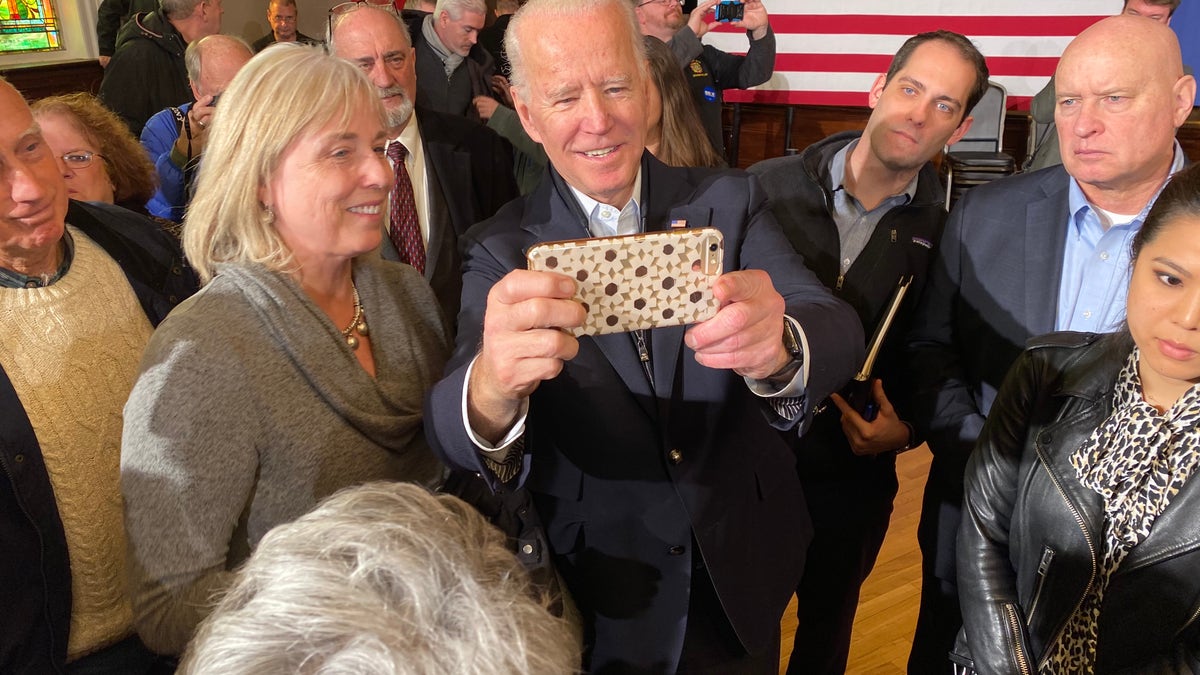Buttigieg narrowly leads Sanders in Iowa caucuses with 97% of precincts reporting
Iowa Democratic Party officials reveal new details on delay in caucus results; Reaction and analysis from Fox News Decision Desk Director Arnon Mishkin.
MANCHESTER, N.H. --Three days after the Iowa caucuses, Sen. Bernie Sanders of Vermont is declaring victory over Democratic presidential rival Pete Buttigieg in the first contest in the presidential nominating calendar.
But The Associated Press announced Thursday that it cannot declare a winner in Iowa at this time.
Speaking to reporters Thursday at a news conference at his New Hampshire campaign headquarters, Sanders thanked Iowans “for the very strong victory they gave us at the Iowa caucuses on Monday night.”
“Even though the vote tabulations have been extremely slow, we are now at a point with some 97 percent of the precincts reporting, where our campaign is winning the popular initial vote by some 6,000 votes. In other words, some 6,000 more Iowans came out on caucus night to support our candidacy than the candidacy of anyone else," Sanders explained.
And he emphasized that “when 6,000 more people come out for you in an election than your nearest opponent, we here in northern New England call that victory.”
The populist senator from Vermont who’s making his second straight bid for the White House stressed that “in an election with voter turnout of approximately 180,000 people, and with eight strong candidates competing, a victory margin of some 6,000 votes is pretty decisive.”
Sanders’ declaration of victory comes three days after Buttigieg -- the former South Bend, Ind., mayor -- preemptively declared a preemptive victory, saying to supporters in Iowa that “we don't know the results. But we know, by the time it's all said and done, you have shocked the nation … because, by all indications, we are going on to New Hampshire victorious.”
Hours later, after hitting the ground in New Hampshire, Buttigieg highlighted that “we quieted those voices who said we shouldn’t be there in the first place. Now it’s up to famously independent New Hampshire.”
Buttigieg points to his lead in state delegate equivalents (SDE) – which are the traditional way the Iowa caucus results have been reported for half a century.
But after Sanders narrowly lost to eventual nominee Hillary Clinton in the 2016 Democratic caucuses, he and his supporters complained to the Democratic National Committee and urged that the popular raw vote totals also be released. The DNC mandated that Iowa increase its reporting. The state party went even further, not only reporting the first round of raw vote totals but also the second round, after the realignment.
Sanders on Thursday took aim at the SDEs, saying, “Because of changes to Democratic Party rules that were widely supported during the Democratic Unity Reform commission, these state delegate equivalents have greatly diminished importance from past caucuses.”
“To the best of my knowledge, either I or Mr. Buttigieg will end with a tiny fraction of an advantage in the SDEs,” Sanders explained. “But this difference, no matter who inches ahead in the end, is meaningless because we are both likely to receive the same number of national delegates to the Democratic National Convention in Milwaukee.”
Asked why he should be considered the winner instead of Buttigieg, the senator stressed, “Because I got 6,000 more votes.”
And he admitted that "New Hampshire's probably elevated in importance" before noting that, "I think our support here is very solid, and I think it's underestimated."
Yang lays off some of his gang
Democratic presidential candidate Andrew Yang let go of dozens of campaign staffers on Thursday.
The move comes in the wake of a lackluster finish by the tech entrepreneur in Iowa. According to nearly complete results from the Iowa Democratic Party that were delayed due to a reporting debacle, Yang has just 1 percent of state delegates from Monday’s caucuses, which kicked off the presidential nominating calendar.

Democratic presidential candidate Andrew Yang speaks at a campaign event in Plymouth, NH on Feb. 6, 2020
Yang campaign manager Zach Graumann emphasized that “as part of our original plans following the Iowa caucuses, we are winding down our Iowa operations and restructuring to compete as the New Hampshire primary approaches.”
“These actions are a natural evolution of the campaign post-Iowa, same as other campaigns have undertaken, and Andrew Yang is going to keep fighting for the voices of the more than 400,000 supporters who have donated to the campaign and placed a stake in the future of our country,” Graumann stressed.
Among those let go are the campaign's national political director, the deputy national political director, multiple policy staffers and some staffers based in Iowa. The firings were first reported by Politico.
But Yang national press secretary SY Lee insisted that “none of the positions Politico called out were considered senior in our organization”
How are they polling in New Hampshire?
Sanders is the consensus leader in the latest public opinion surveys in New Hampshire.
Just how large his lead he holds over this rivals depends on the poll.
Sanders stands at 24 percent support among likely Democratic presidential primary voters in the Granite State according to a Monmouth University survey released Thursday, with Buttigieg at 20 percent, former Vice President Joe Biden at 17 percent, Sen. Elizabeth Warren at 13 percent and 9 percent for Sen. Amy Klobuchar.
Rep. Tulsi Gabbard of Hawaii and Yang each stand at 4 percent, with Tom Steyer at 3 percent, and Michael Bennet and Deval Patrick registering at 1 percent or less. Five percent of those questioned in the poll – which was conducted Monday through Wednesday – say they’re undecided ahead of Tuesday’s primary.
“Many voters in New Hampshire remain open to switching their support. The muddle out of Iowa hasn’t narrowed the field, but there are some hints in the poll that Buttigieg could be helped and Biden hurt as the caucus results start to sink in,” Monmouth University Polling Institute director Patrick Murray noted.

Former Vice President Joe Biden takes selfies with supporters during a campaign event in Somersworth, NH on Feb. 5, 2020
Mike Bloomberg – who’s not campaigning in New Hampshire or any of the early voting states that hold contests in February – was not included in the poll.
The latest Suffolk University daily tracking poll in New Hampshire for WBZ-TV and the Boston Globe - conducted Tuesday and Wednesday – spotlighted a surge for Buttigieg. The survey showed Sanders at 25 percent support among likely Democratic primary voters in New Hampshire, unchanged from the previous night. Buttigieg stood at 19 percent, up four percentage points from the previous poll, with Biden at 12 percent, edging down 3 points from the previous survey.
Warren stood at 11 percent in the latest poll, with Klobuchar at 6 percent and Gabbard at 5 percent, Steyer at 4 percent, and Yang registered at 2 percent. Bennet and Patrick registered at less than 1 percent, with 14 percent still undecided. New Hampshire voters are traditionally known as late deciders in the presidential primary.
The latest Suffolk poll was conducted entirely after the delayed partial results from Iowa’s caucuses were released. Those numbers – which continue to trickle in -- show Buttigieg in a virtual tie with Sanders at 26 percent in the caucuses. It has Warren at 18 percent, Biden at 16 percent and Klobuchar at 12 percent.
"Pete Buttigieg is charging forward this week, coming from way off the pace to within striking distance of Bernie Sanders, while Joe Biden continues to fall and Elizabeth Warren has not moved,” Suffolk University Polling Research Center director David Paleologos told Fox News.
Fox News' Andrew Craft and Alexandra Rego contributed to this report.














































